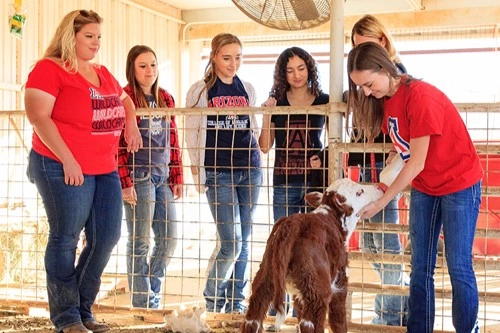Advancing animal management and care
The B.S. in Animal Sciences prepares you for careers relating to animal management, companionship and care. From business to science to entertainment, humanity's productive engagement with animals needs trained leaders like you. With four possible degree emphases, you can customize your courses and experience to fit your passion and plan.
College is a big investment, but a University of Arizona education may be more affordable than you think. No matter your background or family’s financial situation, you have options to make it manageable.
At Arizona, 9 out of 10 students receive financial aid. That means most students pay less than the estimates shown here. By maximizing your financial aid – scholarships, grants, loans, or work-study – you can lower your costs while earning a degree that will pay you back for a lifetime.
Estimated cost of tuition for first-year and transfer students:
- Arizona residents: $13,900/yr
- Non-Arizona residents: $42,300/yr
Get our degree guide to learn how students like you are funding their futures.
Application requirements vary based on your status as a first-time, transfer, international, online or returning student.
- Students who haven't completed 12+ transferable post-high school college credits are considered a first-time college student, and must meet Arizona's core competency requirements to be eligible to apply.
- You are considered a transfer student if you have completed 12+ transferable post-high school college credits.
- If you are under the age of 22 at the start of your desired term, you will need to meet the core competency requirements and have a minimum 2.0 cumulative college/university GPA.
- If you are 22 or older at the start of your desired term, you will need a minimum 2.0 cumulative college/university GPA.
- SAT/ACT scores are not required for general admission.
- You have the option to submit a resume and 500-word personal statement during your application.
Get our degree guide to find out more details about the application process and deadlines.
A degree in animal sciences prepares you for careers in various animal industries and husbandry roles, regulation/inspection, and professional racing animal industries. It can serve as a springboard for graduate school. Although your career possibilities are limitless, here are some example career paths our students follow:
Although your career possibilities are limitless, here are some example career paths our students follow:
- Research technician: Support advancements in genetics, nutrition, reproduction, growth and development on behalf of food production industries; or conduct research into emerging diseases, environmental health, food safety, population health and bioterrorism.
- State or Federal Inspector: Ensure compliance with animal health and safety regulations by inspecting agricultural facilities, livestock operations, and food processing plants.
- Animal Caretaker: Provide daily care and management for animals in settings such as farms, research facilities, and veterinary clinics, ensuring their health and well-being.
- Feedlot Manager: Oversee herd management, animal care and feedlot operations.
- Race horse breeder: Utilize genetics and conformation to select breeding stock that will product superior offspring, assisting with care, training and promotion.
According to the U.S. Bureau of Labor Statistics (2023), the median annual pay for agricultural and food science careers was $76,400 with faster-than-average job growth overall, though entry-level positions may have a lower starting salary.
Ready to start your animal industry career?
From our welcoming local community to our sunny campus, every corner holds the promise of new adventures and personal growth. Your journey to a career at the intersection of animal management, production, companionship and care starts here. Sign up to discover what it means to be a part of the University of Arizona College of Agriculture, Life & Environmental Sciences.



